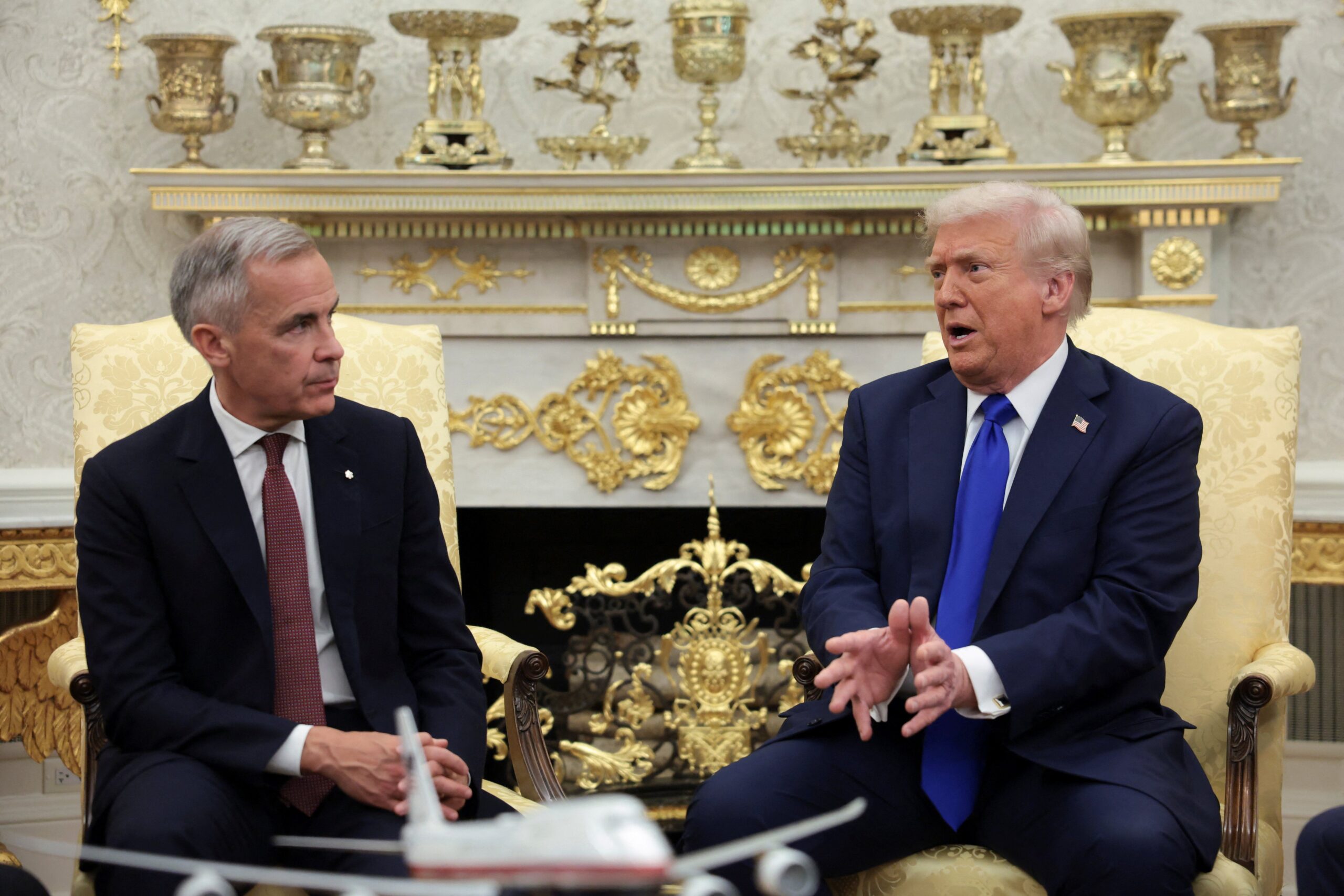Prime Minister Mark Carney of Canada and US President Donald Trump are very different people with very different ideas — and yet they managed to look like old football buddies today as they sat before reporters in the White House.
Trump called Carney a “world-class leader,” “a good man,” and added finally that the PM is “a nice man but he can be nasty” (which was clearly also intended as a compliment.) Carney rolled out a long list of flatteries, claimed that Trump had brought peace to the world, and thanked him for overhauling immigration.
It was a weirdly jovial display, considering that the US president not long ago floated the idea of invading Canada and turning it into America’s 51st state. Not long after doing so, he ended their last press conference in May by claiming that he would make sure Canada was driven out of all car manufacturing. It was awkward, and Carney responded by simply staring into the middle distance.
A lot of people thought that next time they met, the Canadian prime minister might up his game a little. Well, so much for that.
This was mostly a classic Trumpian piece of diplomacy — in other words, a political rally disguised as a routine press availability. The most we were told about a possible trade deal was that the two men admire each other and love each others’ countries and will probably work things out.

“The problem is that they want a car company and I want a car company, and they want steel and I want steel,” said Trump. A number of times, he added, “‘We have a natural conflict.” That statement underlines exactly how incompatible a business mindset is for international diplomacy, but the president doesn’t seem to think so, so I guess then maybe it doesn’t.
Because whose reality matters more than Trump’s reality anyway? The election, the Democrats and Joe Biden took up an inordinate amount of time once again in his answers to reporters’ questions. At one point, he turned to Carney and assured him that he could now take his family out to dinner in DC, but before he became president, the city was a “raging hellhole.”
He talked about “transgender for everybody and windmills all over the place.” He threatened Chicago with military rule, while taking his time over insulting the governor and the mayor. He claimed that after the so-called Big Beautiful Bill, “we don’t need any more bills” — ever.
As Trump detailed how illegal immigrants from prisons and mental institutions in South America had supposedly poured over the southern border during Biden’s presidency and then made their way into Canada, Carney kept nodding along. Because sure, windmills are evil and DC was on fire until very recently and the Democrats are basically insurrectionists and they were going to take away your child and change its sex because of woke, right? Why not?
One wonders how it must feel to watch your leader nod along to all of that.
We all understand that the stakes are high in this meeting. More than 77% of Canada’s exports go to the US, and 36 states export predominantly to Canada. A key trade agreement between Canada, the US and Mexico comes up for review next year, and could have serious consequences for all of those countries’ economies if Trump capriciously decides to tear it up or rewrite the terms. Meanwhile, Canadian aluminum and steel remain heavily tariffed by the US, even though Canada dropped most of its own retaliatory tariffs on the US a few weeks ago.
Carney knows he has a responsibility to work this out for Canada. But it’s also worth noting that Canadian sentiment toward the US is at an extreme low. Canadian rates of tourism to their southern neighbor have dropped sharply throughout 2025, underlining how unamused America’s neighbors over the northern border are by the US president’s politics. They were likely hoping for a bit more pushback from their leader at the White House today, as compared to the capitulation of last time. And needless to say, that’s not what they got.
So many before Carney have tried to play this role: sensible appeaser and diplomat, hoping that most of the world will see the contrast and understand that what they offer is within the bounds of normalcy while what Trump offers is an increasingly erratic list of the first three things that popped into his head.
But we should’ve all realized by now that it doesn’t work that way. There are handshakes and jokes, there are backslaps and bitten tongues. And then one person can tell themselves that they managed to navigate Trump, and that that’s a huge diplomatic win — while the rest of their country sees weakness, and Trump proclaims total victory.
A deal will most likely be done today. It’ll probably be very similar to deals done between the two countries in the past. That was certainly the case between the US and the UK earlier in the year, when Keir Starmer echoed Trump’s claims about a “historic” trade deal that was really anything but.
The Canadian prime minister swallowed a lot today in order not to implode next year’s North American deal. It played well with Trump, but how it plays with the Canadian people is another story.
As for the rest of us: Once again, we are left to wonder why the main players in international diplomacy still haven’t realized that Donald Trump actually isn’t very good at making deals at all — and maybe we should stop handing him participation trophies and letting him tell all the other kids he won.
